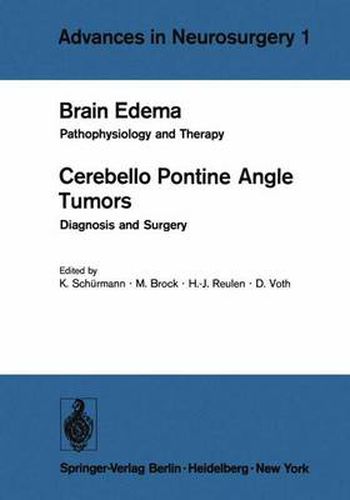Readings Newsletter
Become a Readings Member to make your shopping experience even easier.
Sign in or sign up for free!
You’re not far away from qualifying for FREE standard shipping within Australia
You’ve qualified for FREE standard shipping within Australia
The cart is loading…






This title is printed to order. This book may have been self-published. If so, we cannot guarantee the quality of the content. In the main most books will have gone through the editing process however some may not. We therefore suggest that you be aware of this before ordering this book. If in doubt check either the author or publisher’s details as we are unable to accept any returns unless they are faulty. Please contact us if you have any questions.
This volume contains the papers presented at the 24th Annual Meeting of the Deutsche Gesellschaft fur Neurochirurgie, held in Mainz, Western Germany, on April 30 - May 3, 1973. Deliberate choice was made of two crucial still hotly debated subjects which, for ages, have meant a source of constant worry, and nights without sleep to every neurosurgeon. Just as long as our special field exists, there have been the problems of how to control brain edema and *of how to reduce lethality and the secondary lesions in surgery of cerebello-pontine angle tumors. Concerning the first subject, new pathological, pathophysiological and chemical aspects, the mechanisms of brain edema formation and resolution are presented in the hope for better understanding. Furthermore, the relationship between brain edema, intracranial pressure, cerebral blood flow and metabolism are discussed. Finally, the therapeutical consequences as well as the results of experimental and clinical work are presented, and a comparison of effects between different methods (hypertonic solutions, diuretics, steroids, controlled hyperventilation, hyperbaric oxygen) is given. Concerning the second main subject, any important contributions to the early diagnosis of cerebello-pontine angle tumors have been included. Nevertheless, it is of utmost interest for the neurosurgeon to know which approach he is to prefer for the different stages of tumor size and to be familiar with the trans labyrinthine approach or the posterior craniotomy, as well as with the importance of the use of the microscope in neurosurgery, the preservation of the facial nerve and, in certain cases, its repair.
$9.00 standard shipping within Australia
FREE standard shipping within Australia for orders over $100.00
Express & International shipping calculated at checkout
This title is printed to order. This book may have been self-published. If so, we cannot guarantee the quality of the content. In the main most books will have gone through the editing process however some may not. We therefore suggest that you be aware of this before ordering this book. If in doubt check either the author or publisher’s details as we are unable to accept any returns unless they are faulty. Please contact us if you have any questions.
This volume contains the papers presented at the 24th Annual Meeting of the Deutsche Gesellschaft fur Neurochirurgie, held in Mainz, Western Germany, on April 30 - May 3, 1973. Deliberate choice was made of two crucial still hotly debated subjects which, for ages, have meant a source of constant worry, and nights without sleep to every neurosurgeon. Just as long as our special field exists, there have been the problems of how to control brain edema and *of how to reduce lethality and the secondary lesions in surgery of cerebello-pontine angle tumors. Concerning the first subject, new pathological, pathophysiological and chemical aspects, the mechanisms of brain edema formation and resolution are presented in the hope for better understanding. Furthermore, the relationship between brain edema, intracranial pressure, cerebral blood flow and metabolism are discussed. Finally, the therapeutical consequences as well as the results of experimental and clinical work are presented, and a comparison of effects between different methods (hypertonic solutions, diuretics, steroids, controlled hyperventilation, hyperbaric oxygen) is given. Concerning the second main subject, any important contributions to the early diagnosis of cerebello-pontine angle tumors have been included. Nevertheless, it is of utmost interest for the neurosurgeon to know which approach he is to prefer for the different stages of tumor size and to be familiar with the trans labyrinthine approach or the posterior craniotomy, as well as with the importance of the use of the microscope in neurosurgery, the preservation of the facial nerve and, in certain cases, its repair.